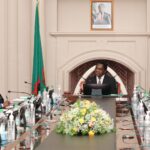Dr. Fred M’membe, leader of Zambia’s Socialist Party, has sparked a heated debate on Africa’s governance systems by challenging the effectiveness of electoral democracy and drawing attention to the rising number of military coups in West Africa. Speaking at the Conference on Solidarity with the Sahel in Algiers, M’membe criticized electoral processes as being manipulated by imperialist forces and economic elites, often failing to deliver true democratic outcomes. His remarks, which align with a growing discontent about Africa’s political systems, have stirred both support and concern.
M’membe’s criticisms focused on the electoral processes in many African nations, which he described as “sham elections” designed to maintain the status quo. He argued that these elections are tools of manipulation by external powers and economic elites, and they rarely reflect the genuine will of the people. His stance resonated with those disillusioned by irregularities, electoral fraud, and the domination of politics by a small political and economic elite.
M’membe’s comments come at a time when military coups have surged in countries like Mali, Burkina Faso, Guinea, and Niger. He framed these military takeovers as bold rejections of external interference and corruption, portraying them as acts of resistance against neocolonialism. He pointed to the leadership of Captain Ibrahim Traoré of Burkina Faso, comparing him to revolutionary leader Thomas Sankara. “If we celebrate Sankara’s ideals, how can we not recognize Traoré’s courage?” M’membe questioned, drawing parallels between the two leaders’ anti-imperialist stances.
While M’membe’s critique of flawed electoral processes has garnered support from those disillusioned with democratic systems in their current form, his endorsement of military coups as alternatives to weak democracies is controversial. Experts warn that military coups, while they may offer temporary disruption of entrenched systems, often fail to establish sustainable and democratic governance. Historical examples show that military regimes frequently centralize power, suppress civil liberties, and struggle to implement meaningful reforms.
M’membe’s comments, however, reflect a growing frustration with the inability of democratic systems to meet the needs of ordinary citizens. His call for a reimagined governance model that transcends flawed electoral systems resonates with some, but the potential dangers of advocating for military takeovers are clear. Such regimes, though popular in the short term, often struggle with the complexities of governance, and the consolidation of power within the military can lead to further instability.
Captain Ibrahim Traoré of Burkina Faso, a key figure in recent West African military coups, has gained popular support with his anti-imperialist rhetoric and promises of reform. Yet, as Mamane Sani Adamou, a fellow panelist at the conference, pointed out, lasting progress requires systemic change, not merely the replacement of one form of governance with another. “True progress requires inclusive systems and accountability, not just the replacement of one form of governance with another,” Adamou said.
International bodies, including the African Union (AU) and the United Nations (UN), have strongly condemned military interventions in African politics, stressing the importance of constitutional governance. They argue that coups undermine democratic principles, human rights, and stability. Promoting pro-coup rhetoric, they warn, could isolate nations from global partnerships and hinder development efforts.
Carlos Ron, an analyst from Venezuela’s Simon Bolivar Institute, offered a more balanced perspective. While acknowledging that imperialism’s decline offers opportunities for new governance models, Ron cautioned against relying on military rule. He emphasized that the road to true sovereignty lies in prioritizing democracy, accountability, and sustainable reforms over unilateral military actions.
Dr. M’membe’s remarks underscore the tension between rejecting flawed electoral systems and the dangers of military rule. While his critique of electoral democracy is valid, it is crucial to approach governance reform with a commitment to democratic principles. Africa’s future lies in creating political systems that empower citizens, promote inclusivity, and ensure long-term stability and development. Only by balancing revolutionary ideals with effective, accountable governance can the continent hope to overcome its political challenges and secure lasting progress.






